Making the recipe is the easy part. It’ll take ten minutes at the very most. All you need is a good natural soap and a water softener. The challenge I personally had to overcome was how to make this recipe an effective cleaner in hard water (naturally). If you live in the city, hard water probably won’t be a problem for you at all, and you can make my simple laundry powder recipe instead. However, if you are like me and have a natural water supply like a dam, stream or bore hole then you most probably have a hard water supply too. So you may want to keep reading.
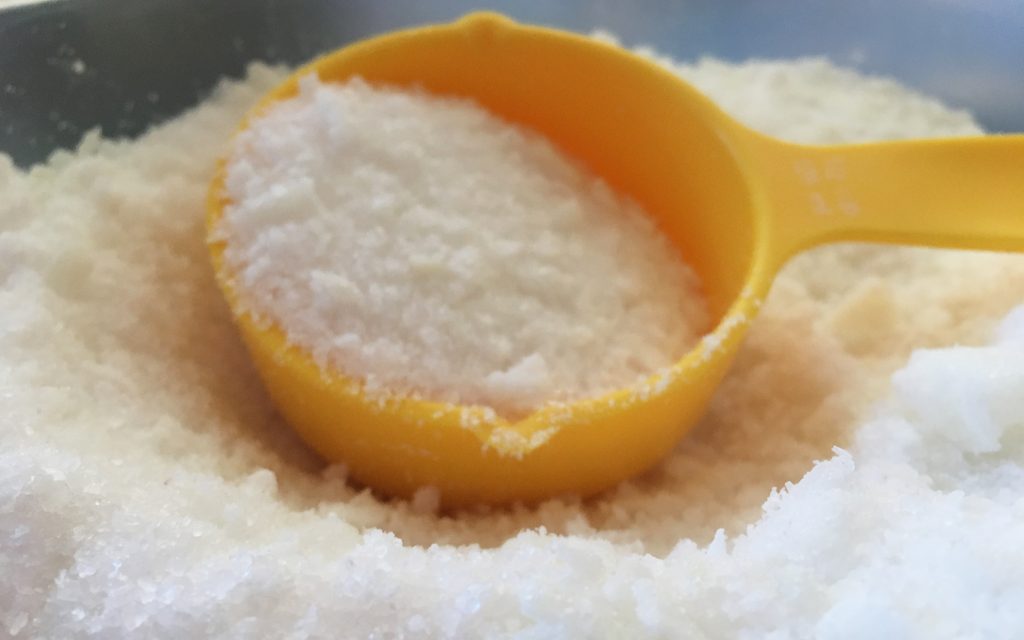
Laundry Powder For Hard Water
Ingredients
- 100g Natural Soap Bar (coconut oil based soap is best)
- 300g Washing Soda
- 600g Fine Salt (pure, not iodated)
- 10ml Eucalyptus or Orange essential oil (optional)
Instructions
- Makes 1 kilogram.
- Finely grate your natural soap, either with a grater or food processor. The finer you grate your soap, the more readily it will dissolve.
- Combine all ingredients together and mix thoroughly.
- Optional: Add your essential oil according to your fragrance preference. I personally add a whole 10ml bottle of eucalyptus or orange essential oil to this recipe.
- Use 1/2 cup of the mixture for small or lightly soiled laundry. Use 1 cup of the mixture for bigger or heavier soiled laundry.
- Use within 2 years.
Notes
1.) This recipe is best suited for cold washes in hard water. For variations of this recipe please see the full blog post.
2.) Citrus essential oils and eucalyptus have degreasing and stain-removing properties which are ideal for laundry, but you can use any essential oil for its fragrance.
3.) You can multiply the quantities in this recipe to make a bigger batch.
4.) Caution: Do not touch or ingest the washing soda, because it is very alkaline and will burn your skin. If you do touch it, rinse your hands thoroughly with cold water, and then wipe them with vinegar to neutralise. Be careful to mix it thoroughly into the recipe so that it is evenly distributed.
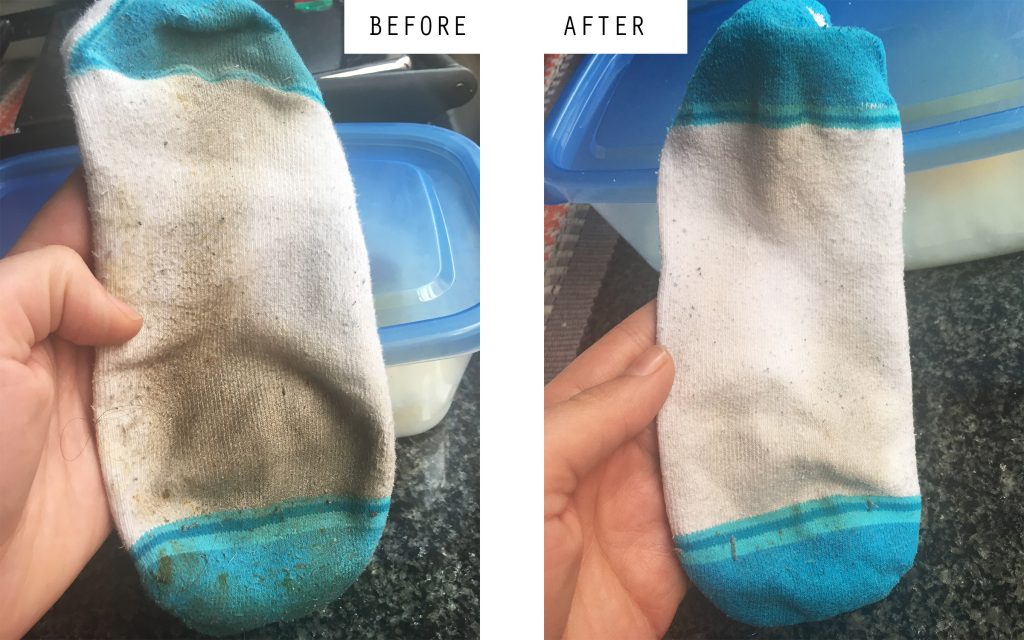
What is hard water?
Hard water is defined as having high levels of minerals like calcium and magnesium. The higher the concentration of these minerals, the harder the water is said to be. Rain water is soft, but as the water filters through the ground, it picks up minerals along the way. This is why natural water sources are often harder than city water supplies, which remove these minerals in the water purification process.
Why is it a problem?
There’s no problem in drinking hard water. It’s actually richer in essential mineral nutrients than processed tap water. However, these same minerals are what make hard water a problem for laundry. Hard water does not clean as effectively as soft water. The minerals in hard water react with soap and form scale/ scum. The trouble with washing laundry with hard water is that most of the detergent is used up softening the water as it binds to the minerals, before it can even get to cleaning it. For an effective wash, you would need to use more detergent and wash at a higher temperature. This is not an option for me. It’s expensive, and hot water cycles are not energy efficient. So onto plan B…
Natural Ingredients that soften water
After some research, I learned that the following ingredients can be used to chemically soften water. These ingredients bind to the calcium and magnesium ions in hard water to form solid particles which can be rinsed away. In other words, the problematic minerals are bound and made ineffective, so that the soap can do its job.
To make an effective laundry powder, you simply need to combine a finely grated natural soap with one (or more) of the following water softeners. Each ingredient has its advantages and disadvantages, so the choice is yours depending on what you are looking for. Here’s a convenient table which summarises the below information:
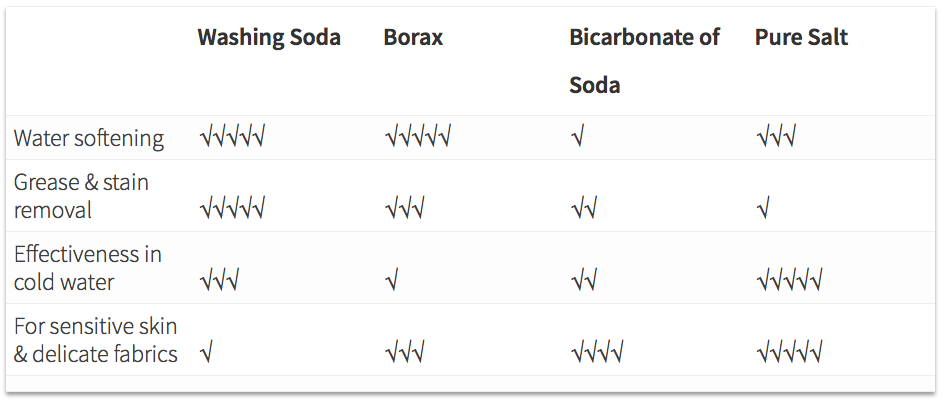
Washing soda
Also known as sodium carbonate (Na2CO3) or soda ash, which is not the same as bicarbonate of soda (NaHCO3). Bicarbonate of soda will not chemically soften water. Washing soda is more soluble than borax, and it also has a much higher pH (11), which makes it the most effective ingredient (in this list) at removing grease, stains and soap residue. However, this caustic property of washing soda may cause skin irritation if clothes are not thoroughly rinsed. You should also wear gloves when handling washing soda.
You can make washing soda from bicarbonate of soda by heating it to 200 degrees celsius in the oven. Here’s how.
Best used for: Hard water; stubborn stains; hot or cold water cycles.
Borax
Also known as sodium borate (Na2B4O7·10H2O) is not the same as boric acid (H3BO3), and it is a naturally occurring mineral that can be found in dry lake deposits worldwide. Borax will chemically soften water in the same way that washing soda does. It has a pH of around 9.5, which makes it gentler than washing soda (in terms of skin irritation & abrasiveness), but less effective at removing grease and stains.
Best used for: Hard water, average stains; warm/ hot water cycles.
Bicarbonate of soda
Sodium bicarbonate (NaHCO3) does not chemically soften water, but it is less abrasive and makes the water feel softer to the skin. It will help remove odours from fabrics, but since it has a pH of about 8, it is not as effective as washing soda in removing stains. If you are doing laundry for babies, people with sensitive skin, or washing delicate fabrics, then this is a good ingredient to use instead of washing soda. If you already have a soft water supply, then this is a good ingredient to include in your recipe, because the soap will be successful at cleaning without the need for a softening agent.
Best used for: Soft water, basic cleaning (no stains) in warm/ hot water cycles (30-40 degrees C).
Sea Salt
Avoid using table salt, as it contains additives that will interfere with the chemical reaction and make it ineffective at softening water. The purest quality of salt is the most effective at softening water. Salt has a pH level of about 7, making it the least alkaline. In other words, salt is the least effective at removing grease and stains, but it is the most gentle on sensitive skin and fabrics.
Best used for: Hard or soft water, basic cleaning (no stains) in cold water cycles.
Recipe variations
Here are some variations of the above recipe to try for different water types, temperatures etc. These are just my suggestions based on what I know about the properties of each ingredient. The numbers represent “parts” i.e. The table shows ratios of each ingredient.
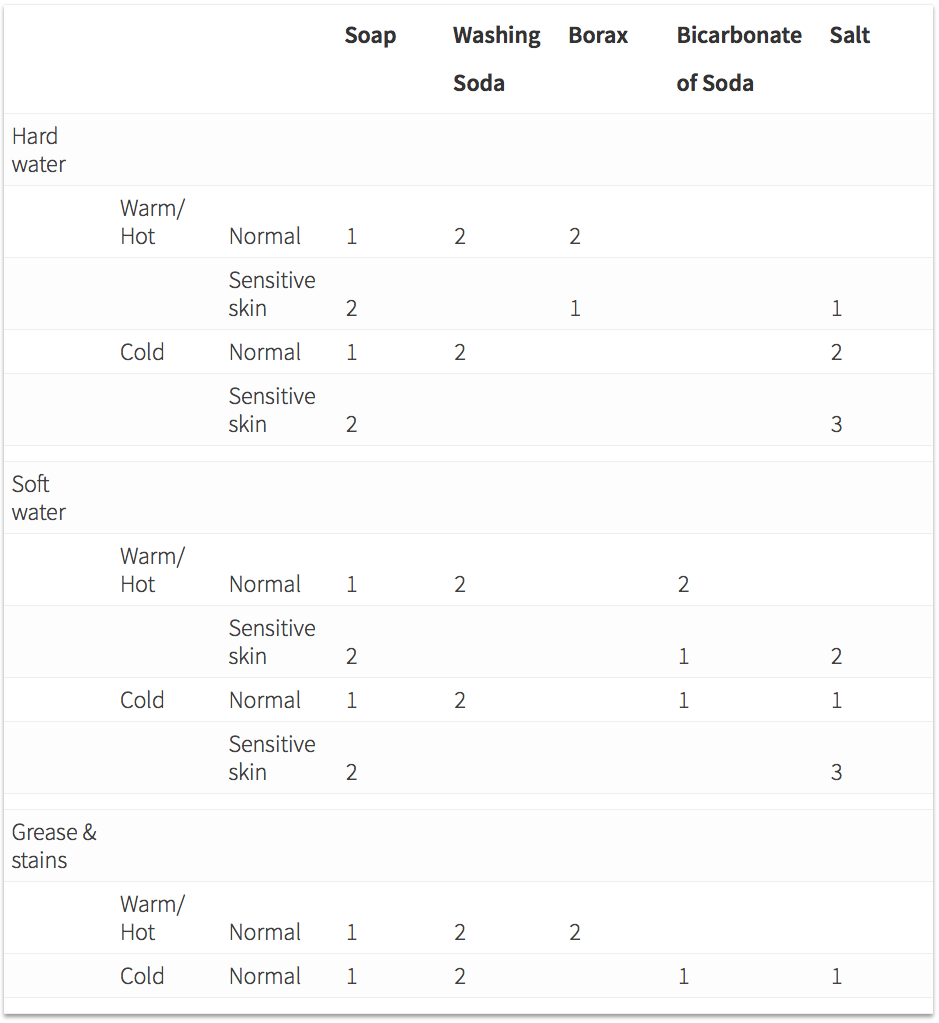
COST & SHELF LIFE
Cost Price: R75 per 1kg
Lasted me about: 1 month doing one load per week.
Estimated shelf life: 2 years if stored away from direct sunlight and moisture.
*Costs accurate at the time of writing, and based on best retail prices I’ve found.
CHALLENGE
If my recipe doesn’t work for you, then finding the right combination of water softeners that do work for you may require a bit of experimentation.
CHERRY ON TOP
- Toxin-free laundry. Remember toxins are absorbed through our skin.
- Eco-friendly: Since the byproducts are naturally occurring, the wash water is greywater friendly, septic tank friendly and safe for animals including aquatic life.
- Energy efficient: Since this works with cold loads, it saves energy.
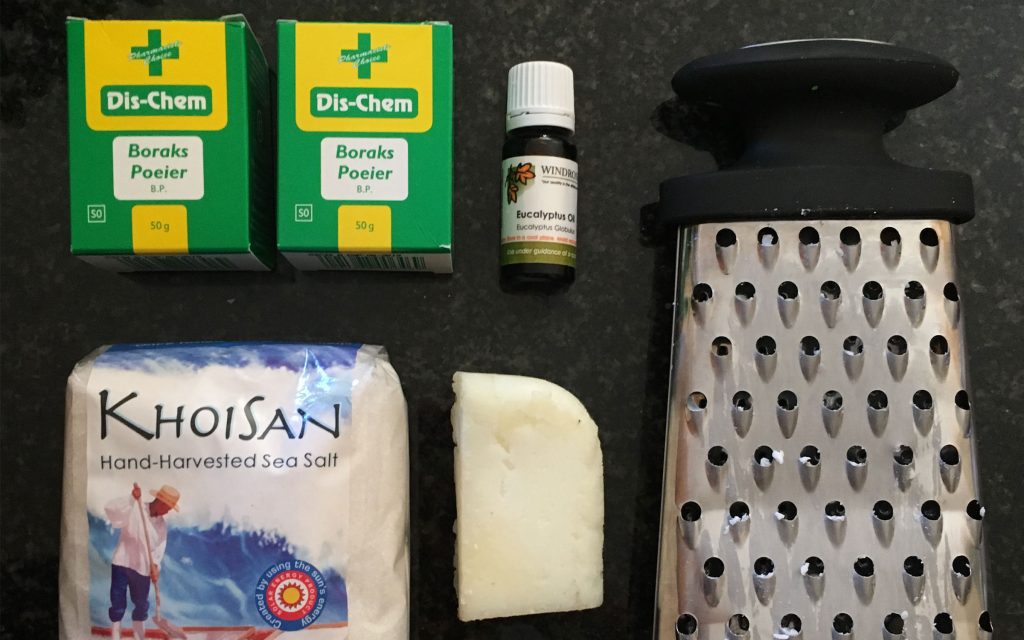
INGREDIENTS
- Natural soap: Coconut oil based soap is the most effective at tough cleaning. You can either make your own or buy a soap bar online or from farmer’s markets & health stores.
- Washing soda: You can make washing soda from bicarbonate of soda, or you can buy it from places like Makro (About R40 for 1.5kg). In South Africa, you probably won’t find it under the name “washing soda” but instead “soda ash”. You will also probably find it in the swimming pool aisle, as it is commonly used to increase the pH of swimming pools (which thus makes it safe for your skin/ laundry when diluted). If you buy it, just make sure that the only ingredient is soda ash/ sodium carbonate. You don’t want any additives!
- Borax: This ingredient is more common to find in grocery stores than washing soda, and you will most likely find it in the baking aisle and sometimes in the laundry aisle. Otherwise, Makro and possibly Clicks will stock it. You may find it in some pharmacies too.
- Bicarbonate of soda: Can be found in most grocery stores, although only some stores stock the big 500g box which is the most cost-effective option. You can also buy it online here.
- Pure salt: Some grocery and/or health stores will sell pure salt, but if not, you can buy it online here.
Need help finding these, or other ingredients? My shopping guide may help you.
RECOMMENDED RETAIL OPTIONS
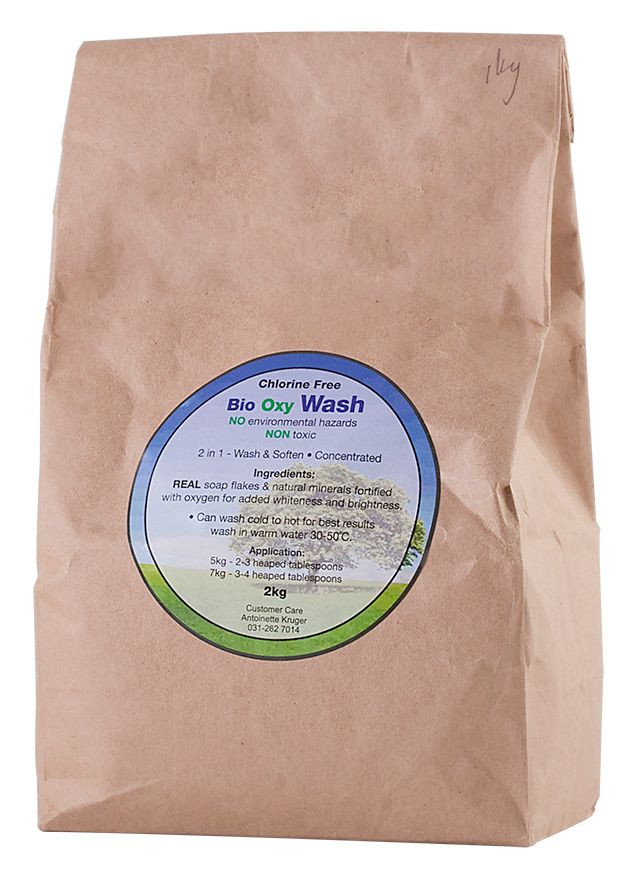
If you don’t want to make this yourself, then I recommend buying Londa Biowash Laundry Powder, which I have personally used and approved for doing laundry with hard water. This is the most similar product to my recipe for hard water. Unfortunately, the paper bag is lined with an inner plastic bag.
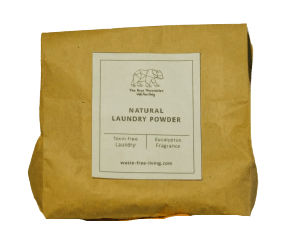
If you have a normal (soft) water supply, then I recommend buying The Bear Necessities Laundry Powder, which I have used while doing laundry in the city. This is the the most affordable natural laundry powder on the market, and it really is plastic-free. I love that they offer a 1kg refill in a brown paper bag, so that you can top-up their glass jar option. But you can also just skip the glass jar product altogether, and buy the paper refill bag to top-up your own container at home.
How do you effectively and naturally wash your laundry in hard water? Please share in the comments below.

Well, this is the best washing powder I have ever used. It leaves the washing super soft including towels. As an aromatherapist I highly recommend this for therapy towels..removes the oil beautifully. Brilliant and well done Christina
I’ve recently been introduced to this laundry alternative. I’ve been searching the web and your blog is the first South African one I have come across, I am now eager to try it purely because all places that you have mentioned are familiar to me.
Thank you so much for your positive feedback. Offering recipes with local ingredients and suppliers is exactly why I started this blog. I’m so glad that you’ve found it resourceful as a South African. Yay! Mission accomplished 🙂
Going to give this a try – very excited
You say 1 cup per load, what size washing machine ?
I have a 7kg front loader washing machine.